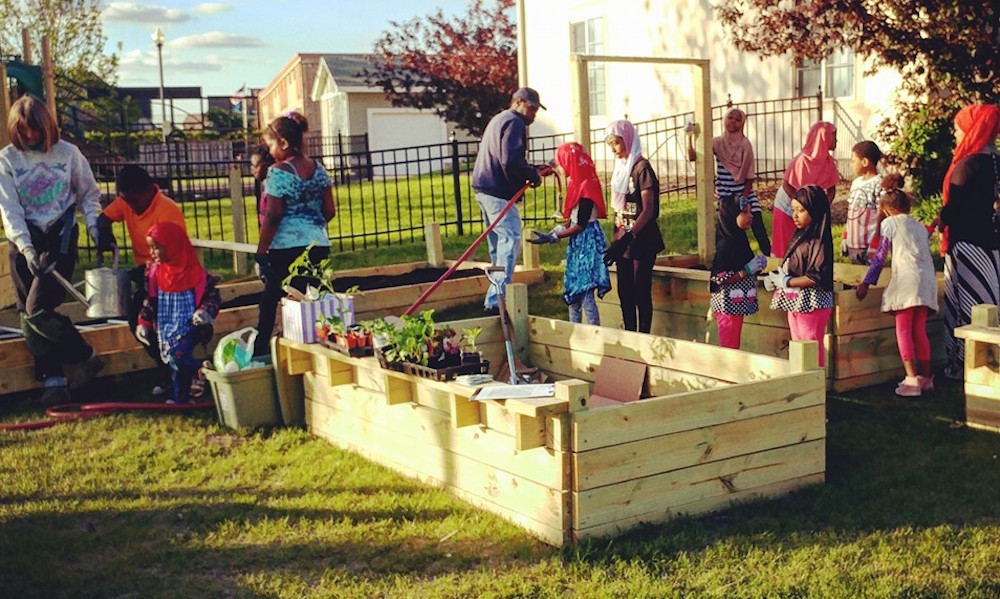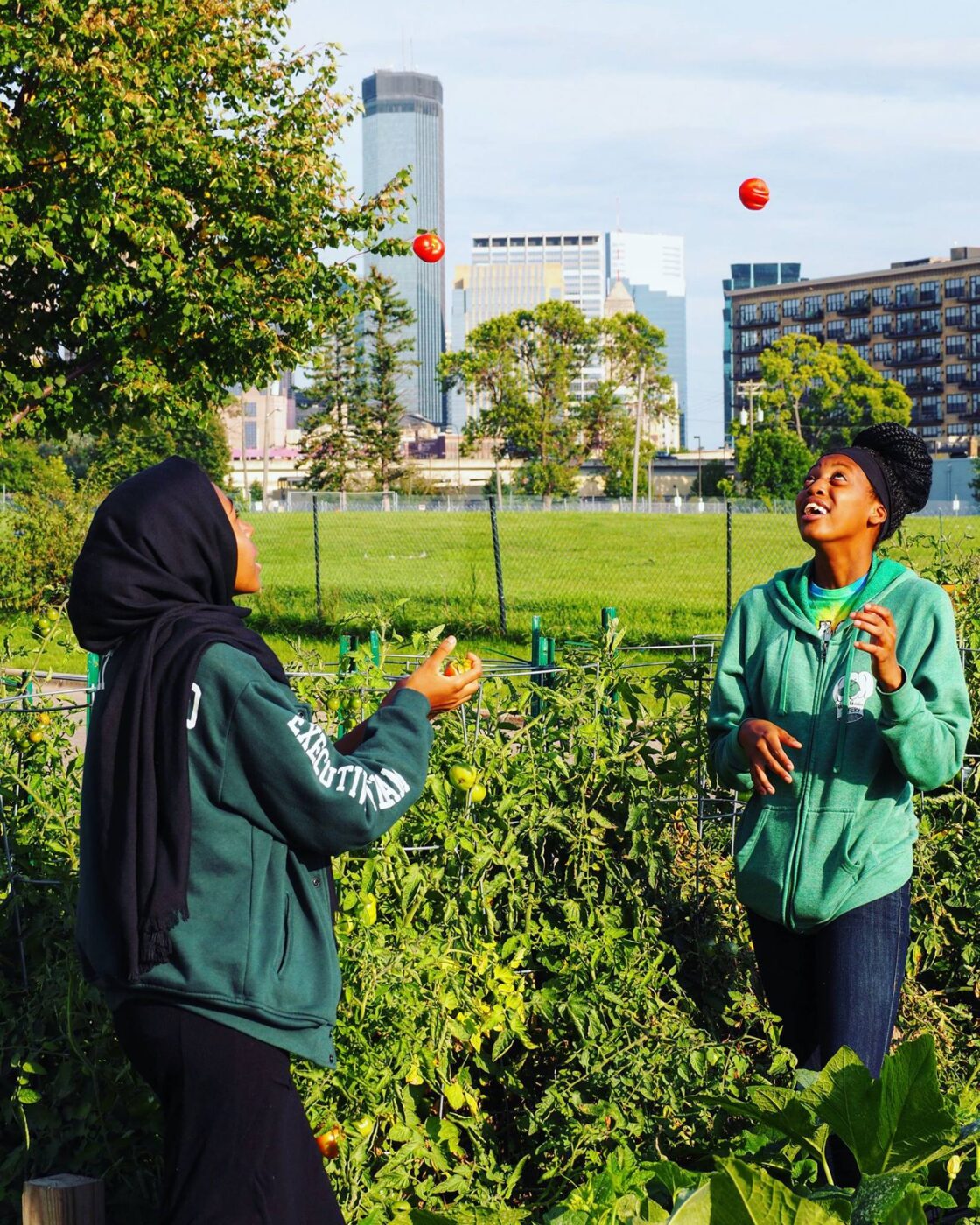These Teens Are Giving Their Food Desert Community a Makeover with Veggie Based Desserts

In 2014, a group of Minneapolis teens wanted to help raise funds to support a friend who had been paralyzed in a car accident. Three years later, those same young people are the driving force behind Green Garden Bakery, a teen-run business that cultivates local youth leaders and challenges the community’s status as a food desert.
The USDA defines a food desert as an area where residents live more than one mile from a supermarket (in urban or suburban areas) or more than ten miles from a supermarket in rural areas. Studies have shown that residents of food deserts have an increased risk of heart disease as well as other health problems, such as metabolic disease. In 2010, the Department reported that a whopping 23.5 percent of Americans lived in a food desert, including residents of Heritage Park, Minneapolis.
While some initiatives have been taken to eradicate food deserts on a national level, notably by former First Lady Michelle Obama, some of the most inspirational stories are uniquely local efforts, including the one spearheaded by this group of entrepreneurial teens

Beginnings Rooted in Community
While Green Garden Bakery‘s official beginnings stemmed from a fundraising project to help a friend, for rising high school senior Leensa Ahmed, the CEO/CFO of the organization and a 12-year resident of Heritage Park, the inspiration began even earlier.
As a young black, Muslim woman all the odds are against me, but I’m proving I’m a kickass boss.
Ahmed recalls that she was in the third grade when she discovered Active Chefs, a class that taught kids in the neighborhood about cooking, gardening, and nutrition.
“The class had been started by local community partners to address food insecurity in our neighborhood,” she says. She and a friend joined and, she recalls, “After participating for a few years we decided we wanted to apply our new skills to making a bigger difference in our community.”
They put one of their favorite recipes to work: a green tomato cake made with excess tomatoes from their community garden.
“At our very first sale in 2014, our goal was to make $500,” she says. “We sold the cakes for $5 and made over $1,500 in one day. For a bunch of middle schoolers, we sure thought we were rich.”

A Business Rooted in Independence
From these grassroots effort, a true business was born. Today, a group of 16 youth leaders run Green Garden Bakery, with support from local adult advisors and not-for-profit organization Urban Strategies, which works to help communities to build safe neighborhoods in urban centers.
“None of us have had any formal business classes or parents who worked in business,” says Ahmed. “We learned early on that in order to be successful we need to network with local businesses and experts in the field.”
But while the teens have learned to take advantage of the experience of the adults around them, the large majority of their success comes from their effort and their effort alone.
Together, the teens grow vegetables in their community garden, bake them into healthy, vegetable-based desserts, and sell them via a “pay-what-you-can” model.
“This creates accessibility for everyone and also allows customers to pay more for a product they believe in,” says Ahmed, who also notes that she has found that the group’s profits are higher with this model than with fixed prices.
Any revenue brought in by the Bakery is divided in three: one-third is reinvested into the business, one-third is paid to the youth leaders for their time and effort, and one-third is donated to community projects. As a group, the Bakery has not only purchased a “talk-to-text” computer to help their paralyzed friend communicate independently but also purchased home security systems for neighbors who were the victims of home robberies and supplied cakes for a local women’s shelter event in their neighborhood.
And the teens aren’t stopping there.
Today, the group grows thousands of pounds of produce and has recently added a new garden site, but the teens are constantly on the lookout for ways to grow and expand their business: they have cultivated a network of urban farmers from whom they can glean excess produce and plan to build a hoophouse to expand their growing season, with the eventual goal of adding a greenhouse and aquaponics system for year-round growing capability.
They are also planting a plot of zucchini in front of Minneapolis Schools Nutrition Distribution Center, where the group’s muffins will be served in school lunches, and a recent crowdfunding campaign should soon allow them to have a commercial kitchen within their community.
“Since we are a community-based business, we believe it is critical to have our new production location and storefront located in our community,” says Ahmed. “By building our facility here in our neighborhood, we’ll be able to benefit from the additional traffic that will flow through our neighborhood thanks to the future Light Rail expansion.”
Cultivating a New Future
The teens aren’t just contributing to their community; they’re also growing as leaders.
Ahmed notes that not only do the teens learn from one another’s strengths, but the experience has been, on the whole, an incredible educational experience for everyone involved.
“It teaches us so many tangible skills: mathematics, time management, organization, teamwork, not to mention it’s a creative outlet,” says Ahmed. “Food feeds our mind in so many ways and it has become therapeutic for most of us to be in the kitchen, just like the garden is our happy place.”

Creativity is key in developing new recipes: Ahmed loves the Bakery’s gluten-free lemon zucchini muffins, but the group has also recently developed seasonal specialty items like vegan lavender blueberry scones, vegan jalapeño chocolate chip cookie ice cream sandwiches, and East African sweet potato donuts using Somali spices, which were released in honor of Eid.
Of course, many of the youth leaders will soon be heading off to college. Ahmed herself hopes to study something where Muslims, women, and people of color are underrepresented, like business, STEM, or political science.
“Within society we are the minority, but our diversity is what defines us and our community,” says Ahmed. “As a young, black, Muslim woman all the odds are against me, but I’m proving I’m a kickass boss.”
No matter where she ends up, Ahmed and the other youth leaders plan to remain on the Bakery’s alumni board to support the new generation of leaders. Already, 150 younger teens are being shown the ropes by the older leadership team, including Ahmed’s four younger siblings.
“Our goal is for these younger kids to take over our leadership positions as we head off to college and beyond,” says Ahmed.
Related on Organic Authority
Opening Supermarkets in Food Deserts Improves Health of Residents, Even if They Don’t Buy Healthier Food
The Genius Ways Some Cities are Eradicating Food Deserts
A Former Food Desert Feeds a Community’s Spirit

